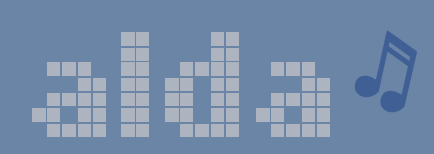Installation
|
Docs
|
Changelog
|
Contributing
composers chatting
New to Alda? You may be interested in reading this blog post as an introduction.
Inspired by other music/audio programming languages such as PPMCK, LilyPond and ChucK, Alda aims to be a powerful and flexible programming language for the musician who wants to easily compose and generate music on the fly, using only a text editor. Alda is designed in a way that equally favors aesthetics, flexibility and ease of use, with (eventual) support for the text-based creation of all manner of music: classical, popular, chiptune, electroacoustic, and more!
- Easy to understand, markup-like syntax
- Designed for musicians who don't know how to program, and programmers who don't know how to music
- A score is a text file that can be played using the
aldacommand-line tool - Interactive REPL lets you enter Alda code and hear the results in real time
- Supports writing music programmatically (for algorithmic composition, live coding, etc.)
- Create MIDI music using any of the instruments in the General MIDI Sound Set
- Define and use waveform synthesis instruments
- Import MIDI files
- Export to MusicXML for inter-operability with other music software
- A more robust REPL, tailor-made for editing scores interactively
If you're a developer and you'd like to help, come on in -- the water's fine!
piano: o3
g8 a b > c d e f+ g | a b > c d e f+ g4
g8 f+ e d c < b a g | f+ e d c < b a g4
<< g1/>g/>g/b/>d/g
For more examples, see these example scores.
You must have Java 8+ installed on your system in order to run Alda.
(Chances are, you already have a recent enough version of Java installed.)
-
Go to the latest release page and download
alda. -
Make the file executable:
chmod +x alda -
Make
aldaavailable on your$PATH:Using
/usr/local/binhere as an example; you can use any directory on your$PATH.mv alda /usr/local/bin
-
Go to the latest release page and download
alda.exe. -
Make the file executable:
- Go to your downloads folder, right click
alda.exeto open up its file properties, and clickunblock
- Go to your downloads folder, right click
-
Copy
alda.exeto a location that makes sense for you. If you follow standard Windows conventions, this means creating a folder calledAldain yourProgram Files (x86)folder, and then moving thealda.exefile into it. -
Make
aldaavailable on yourPATH:- Go to the Windows
SystemControl Panel option, selectAdvanced System Settingsand then click onEnvironment Variables, then edit thePATHvariable (either specifically for your user account or for the system in general) and add;C:\Program Files (x86)\Aldato the end. Save this edit. Note that if you placedalda.exein a different folder, you will need to use that folder's full path name in your edit, instead.
- Go to the Windows
You will now be able to run Alda from anywhere in the command prompt by typing alda, but note that command prompts that were already open will need to be restarted before they will pick up on the new PATH value.
Once you have Alda installed, you can update to the latest version at any time by running:
alda update
Default JVM soundfonts usually are of low quality. We recommend installing a good freeware soundfont like FluidR3 to make your MIDI instruments sound a lot nicer.
For your convenience, there is a script in this repo that will install the FluidR3 soundfont for Mac and Linux users.
To install FluidR3 on your Mac or Linux system, clone this repo and run:
scripts/install-fluidr3
This will download FluidR3 and replace ~/.gervill/soundbank-emg.sf2 (your JVM's default soundfont) with it.
To replace the default soundfont on a Windows OS:
- Locate your Java Runtime (JRE) folder and navigate into the
libfolder.- If you have JDK 8 or earlier installed, locate your JDK folder instead and navigate into the
jre\libfolder.
- If you have JDK 8 or earlier installed, locate your JDK folder instead and navigate into the
- Make a new folder named
audio. - Copy any
.sf2file into this folder.
A variety of popular freeware soundfonts, including FluidR3, are available for download here.
For the best experience when editing Alda score files, install the Alda file-type plugin for your editor of choice.
Don't see a plugin for your favorite editor? Write your own and open a pull request to add it here! :)
First start the Alda server (this may take a minute):
alda up
To play a file containing Alda code:
alda play --file examples/bach_cello_suite_no_1.alda
To play arbitrary code at the command line:
alda play --code "piano: c6 d12 e6 g12~4"
To start an Alda REPL:
alda repl
Alda's documentation can be found here.
We'd love your help -- Pull Requests welcome!
The Alda project is composed of a number of subprojects, each of which has its own GitHub repository within the alda-lang organization.
For a top-level overview of things we're talking about and working on across all of the subprojects, check out the Alda GitHub Project board.
For more details on how you can contribute to Alda, see CONTRIBUTING.md.
Slack: Joining the Alda Slack group is quick and painless. Come say hi!
Reddit: Subscribe to the /r/alda subreddit, where you can discuss all things Alda and share your Alda scores!
Copyright © 2012-2019 Dave Yarwood et al
Distributed under the Eclipse Public License version 1.0.

